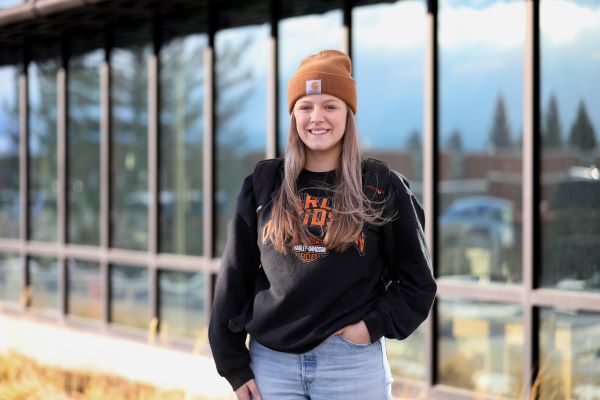Jordan Niggemyer receives George M. Dennison Civic Engagement Scholarship Award

Montana Campus Compact, a network of higher education institutions committed to promoting civic and community engagement, is proud to announce the 2024 George M. Dennison Civic Engagement Scholarship recipients.
Montana Tech student Jordan Niggemyer is one of 10 students receiving the scholarship. Additional 2024 recipients include: Bridgette Shields, Aaniiih Nakoda College; Geri Cutler, Carroll College; Mary Knight, Carroll College; Abigail Pilskalns, Flathead Valley Community College; Kiersten Clark, Flathead Valley Community College; Sophia Adams, Montana State University; Abe Malley, University of Montana; Ashley Wilson, University of Montana and Morgan Hoff, Salish Kootenai College.
This year, the students received $1,000 in scholarships for outstanding community contributions. The recipients were selected based on their dedication to serving others, leadership qualities, and potential to impact their communities positively.
“These students represent some of the amazing college student leadership we see at our campuses every day,” said Haven Gourneau, Montana Campus Compact CEO Council Chair and Fort Peck Community College president. “It’s because of students like these and so many more that college presidents have faith in the future of our communities and state!”
Niggemyer is a mining engineering freshman from Grafton, West Virginia, who volunteers for many community organizations including the local food pantry and soup kitchen, Wreaths Across America, nursing homes, and a camp for underprivileged youths.
When Niggemyer explains her involvement in community activities, it becomes clear that each activity resonates with her for a special reason. She explains that you want to volunteer at the food pantry and the soup kitchen at the end of the month because that’s when the client’s resources are stretched the thinnest, and need is high.
“Some individuals who visit the food pantry have the greatest stories,” Niggemyer said. “I’ve learned lessons from the families that have come in there that I don’t think I could have learned from any education system. It’s great when you can go in there and not just provide someone with a meal, but also with a smile, and listen to their stories.”
Wreaths Across America has a special place in Niggemyer’s heart because as she cared for wreaths at Grafton National Cemetery and West Virginia National Cemetery, she realized that it’s a place where people come to display deep appreciation for those who paid the ultimate sacrifice for the nation. Wreaths Across America is a nonprofit that ensures each veteran grave site has a donated wreath laid atop it during the holiday season.
“Not only are there families who are coming out to visit their loved ones, but there are people who come out to visit graves of people who may not have living loved ones to come to visit,” Niggemyer said.
Volunteering at senior homes and delivering Christmas cards to the elderly is also important to Niggemeyer.
“We want to give them something that comes from heart,” Niggemyer said. “Although they might be getting older we can still show them they are still appreciated and loved.”
Niggemyer has one more additional volunteer experience that is the most challenging, but also the most rewarding. In the summer, Niggemyer gives her time to Camp Horseshoe in Tucker County, West Virginia.
“Almost all the kids who come are from a group home, adoption, foster care or live below the poverty line in Appalachia.”
Campers ages 7-12 are given a standout experience. They learn Spanish, dance, and are taught to make salsa from the garden. Forest Service workers teach campers about what lives in the creek.
Niggemyer initially volunteered for a weeklong session, but quickly realized she wanted to stay the whole summer. She was a camp counselor twice, and a kitchen worker once.
In her time on kitchen duty, she realized that many campers have not experienced what most people take for granted.
“Kids come in, and they’ve never had some of the meals before,” Niggemyer said. “It will be something as simple as chicken tenders or mashed potatoes. It’s a little thing that makes a huge difference because you realize that this might be their first real meal in a long time.”
Meals are served family style, around a table, and it becomes apparent that some campers do not have an environment at home where someone sits down at dinner and asks them how their day went.
Sometimes, counselors have had to report physical or mental abuse to authorities that campers experienced at home.
“We have some kids that come in with one family, and then they have to leave with another one,” Niggemyer said. “For the week they are at camp, you know you can’t prepare them for everything they will face in the world, but you can give them a great experience while they are there.”